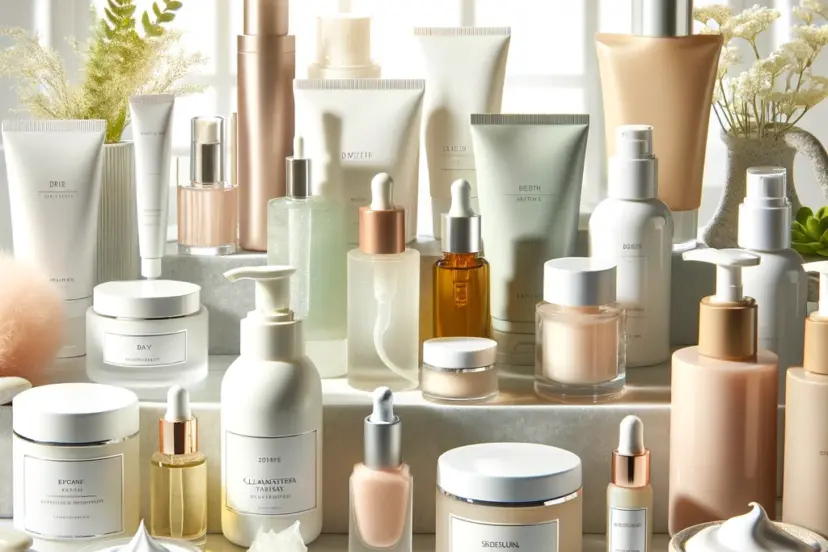Skincare Essentials – A Complete Guide
Introduction to Skincare Essentials
Understanding the importance of skincare essentials is the first step to unlocking the secrets to a flawless complexion. It’s not just about aesthetics; it’s about maintaining healthy skin that can protect you against environmental aggressors and age gracefully over time. Knowing your skin type is crucial in selecting the right products that will work best for you. Whether you’re oily, dry, combination, or sensitive, there’s a skincare routine that’s perfect for you.
Basic Skincare Essentials Routine
Let’s delve a bit deeper into the foundational steps of any effective skincare regimen: cleansing, toning, and moisturizing. These three steps are crucial for maintaining the health and vitality of your skin, serving as the bedrock upon which you can build a more comprehensive routine.
Cleasing
Cleansing your face might seem like a straightforward task, but it’s a step packed with critical benefits for your skin’s health and appearance. Beyond just removing surface dirt and oil, a good cleanse helps to prevent the buildup of impurities that can lead to acne and dullness. It’s also the first step in allowing your skin to absorb the active ingredients in the rest of your skincare products more effectively. For those wearing makeup or sunscreen throughout the day, double cleansing in the evening can be a game-changer. Starting with an oil-based cleanser to dissolve waterproof makeup and sunscreen, followed by a water-based cleanser like the Gentle Foaming Cleanser from CeraVe, ensures that every trace of the day is gently washed away, leaving your skin fresh and ready for the next steps in your routine. This approach not only keeps the skin clean but also contributes to its long-term health and radiance.
Toning
Toning is a step that bridges the gap between cleansing and moisturizing, preparing the skin for the latter by restoring its natural pH levels that can be disrupted during cleansing. A good toner can provide additional cleansing, targeting residual impurities and dead skin cells, ensuring a thoroughly clean complexion. It also helps to refine pores, giving the skin a smoother appearance and making it less prone to breakouts and irritation. The right toner, such as the Rose Petal Witch Hazel Toner by Thayers, can add a layer of protection by tightening cell gaps after cleansing, reducing the penetration of impurities and environmental contaminants into the skin. Furthermore, toning enhances the skin’s ability to retain moisture, which is vital for maintaining a healthy, hydrated complexion. Incorporating this step into your daily skincare essentials routine can significantly amplify the effectiveness of your skincare regimen, leading to clearer, more balanced, and radiant skin.
Moisturizing
Moisturizing plays a pivotal role in any skincare routine, serving as a crucial step in hydrating and protecting the skin’s barrier. It’s not just about adding moisture; it’s also about sealing in all the benefits of the previous skincare steps and protecting the skin from environmental stressors. A good moisturizer, like Neutrogena’s Hydro Boost Water Gel, can provide immediate relief to dry skin, thanks to its hyaluronic acid content, which draws moisture into the skin for a plump, smooth appearance. This step is essential for all skin types, even oily or acne-prone skin, as it helps to balance skin’s hydration levels and prevent overproduction of oil. Moreover, regular moisturizing can help to minimize the appearance of fine lines and wrinkles over time, as well-moisturized skin appears more youthful and resilient. By choosing the right moisturizer for your skin type and using it consistently every day, you can maintain your skin’s health, elasticity, and youthful glow.
Advanced Skincare Essentials Steps
For those looking to take their skincare essentials game to the next level, incorporating exfoliation, serums, and sun protection can provide remarkable benefits.
Exfoliation
Exfoliation is a transformative step in skincare essentials, crucial for sloughing away dead skin cells that can lead to a dull complexion and clogged pores. By incorporating exfoliation into your routine, you can reveal the fresher, brighter skin underneath, enhancing your skin’s natural renewal process. It’s important to choose an exfoliant that matches your skin type and concerns; chemical exfoliants like the Paula’s Choice 2% BHA Liquid Exfoliant are excellent for penetrating deep into the pores to remove buildup, while being gentle enough to avoid irritation. Regular, but not excessive, exfoliation can significantly improve skin texture and tone, making it smoother and more even. Furthermore, exfoliation enhances the efficacy of the skincare essentials products that follow, allowing serums and moisturizers to penetrate deeper and work more effectively. By carefully integrating exfoliation into your skincare essentials regimen, you can maintain a radiant, healthy-looking complexion that feels as good as it looks.
Serums and Essences
Serums and essences are concentrated formulations designed to target specific skin concerns with high levels of active ingredients. These potent products penetrate deeply into the skin, delivering benefits such as intense hydration, brightening, anti-aging, or acne treatment directly where they are needed most. Unlike heavier creams or lotions, serums and essences have a lighter texture, allowing them to be layered under moisturizers without feeling heavy or greasy. Incorporating a serum or essence into your routine, like the Hyaluronic Acid Serum by The Ordinary, can significantly enhance your skin’s texture and appearance by providing a boost of hydration that plumps up the skin, reducing the visibility of fine lines and wrinkles. Moreover, the use of serums and essences can be customized according to your skin’s changing needs, making them versatile additions to any skincare essentials regimen. By selecting the right product for your specific concerns, you can effectively address them head-on, leading to healthier, more radiant skin.
Sun Protection
Sun protection is an indispensable part of daily skincare essentials, safeguarding the skin from the harmful effects of UV radiation, which can lead to premature aging, hyperpigmentation, and an increased risk of skin cancer. Using a broad-spectrum sunscreen, such as the La Roche-Posay Anthelios Melt-in Milk Sunscreen, can provide high SPF protection while also feeling comfortable on the skin, without the chalky residue often associated with high SPF products. It’s essential to apply sunscreen every morning, regardless of whether it’s sunny or cloudy, as UV rays can penetrate clouds and even glass, reaching your skin. Reapplying sunscreen every two hours when outdoors or after swimming or sweating is crucial for maintaining its protective barrier. Moreover, integrating sun protection into your skincare essentials routine doesn’t just prevent future damage; it can also help mitigate existing signs of photoaging, allowing your skin to heal and rejuvenate more effectively. Prioritizing sun protection is a proactive step towards maintaining long-term skin health, ensuring your skin remains resilient and vibrant.
Addressing Common Skin Concerns
Navigating through common skin concerns like acne, signs of aging, and hyperpigmentation requires a strategic approach tailored to each issue. For acne and blemishes, incorporating products with salicylic acid or benzoyl peroxide, such as the Effaclar Duo from La Roche-Posay, can significantly reduce inflammation and clear up breakouts. To combat signs of aging, retinol products, like the RoC Retinol Correxion Deep Wrinkle Night Cream, work wonders by promoting skin cell turnover and boosting collagen production, leading to smoother, firmer skin. For those dealing with hyperpigmentation, incorporating a vitamin C serum, like the C E Ferulic by SkinCeuticals, can help lighten dark spots and even out skin tone by inhibiting melanin production. It’s also vital to remember that consistency with these treatments, along with sun protection, is key to seeing substantial improvements. Addressing these concerns with targeted treatments allows for a more effective and personalized skincare routine, ensuring that your skin receives the specific care it needs to look and feel its best.
Lifestyle Tips for Healthy Skin
Achieving healthy skin goes beyond just topical treatments; it’s also about nurturing your skin from the inside out. A balanced diet rich in antioxidants, vitamins, and minerals can significantly impact your skin’s health, promoting a radiant and youthful complexion. Staying hydrated by drinking plenty of water throughout the day helps to maintain the skin’s elasticity and can prevent signs of dehydration such as dullness and fine lines. Adequate sleep is another cornerstone of skin health, as it’s during these restful hours that your skin undergoes repair and regeneration. Managing stress through mindfulness practices, exercise, or hobbies can also reduce the occurrence of stress-induced skin issues like breakouts and sensitivity. By incorporating these lifestyle habits, you support your skin’s natural processes, enhancing the effects of your skincare routine and contributing to overall well-being.
The Importance of Consistency
Consistency is the secret ingredient in the recipe for healthy, glowing skin. Establishing and adhering to a daily skincare routine allows the products to work in harmony over time, gradually improving the skin’s condition and preventing potential issues. It’s important to remember that most skincare products, especially those targeting specific concerns like hyperpigmentation or fine lines, require time to show visible results. Skipping days or frequently changing products can disrupt the skin’s balance and delay progress, making it harder to achieve your skincare goals. Moreover, consistent use of sunscreen, in particular, is crucial for protecting the skin from daily UV exposure, which cumulatively contributes to premature aging and increased risk of skin cancer. By committing to a consistent skincare regimen, you’re investing in the long-term health and beauty of your skin, ensuring that it remains vibrant and resilient through the years.
When to Seek Professional Help
There comes a point in your skincare journey where professional help may be necessary, especially when dealing with persistent or severe skin issues that over-the-counter products cannot address. Dermatologists can provide expert diagnoses and recommend treatments tailored to your specific skin concerns, such as prescription medications for acne or eczema, or procedures for more advanced signs of aging and hyperpigmentation. Seeking professional advice is also crucial when you notice any sudden changes in your skin, such as new or changing moles, which could indicate serious health issues. Additionally, a professional can offer guidance on building a skincare routine that complements any medical treatments you might be undergoing, ensuring your skin’s health is optimized. Remember, consulting with a dermatologist is a step towards understanding your skin better and making informed decisions about its care, ensuring that you’re on the right path to achieving and maintaining healthy skin.
Conclusion
Embarking on a skincare journey is a deeply personal and rewarding experience that goes beyond mere vanity; it’s an act of self-care that benefits your overall well-being. The key to success lies not just in the products you use but in understanding your skin’s unique needs and treating it with kindness and patience. Remember, the path to healthy skin is a marathon, not a sprint, and small, consistent steps can lead to significant improvements over time. Encourage yourself to stay informed, be open to adjusting your routine as your skin’s needs evolve, and never underestimate the power of a positive outlook on your skin’s health. Lastly, always celebrate your skin’s progress, no matter how small, and know that by investing in your skincare routine, you’re investing in a happier, more confident you.
FAQs
- How often should I exfoliate my skin?
- The frequency of exfoliation should depend on your skin type and the type of exfoliant you’re using. For most skin types, exfoliating 2-3 times a week is sufficient. However, if you have sensitive or easily irritated skin, you might want to limit it to once a week. Always listen to your skin’s response and adjust accordingly.
- Can I use serums in the morning and at night?
- Yes, serums can be used both in the morning and at night. However, it’s important to choose the serum based on its ingredients and your skin’s needs. For example, antioxidant serums like vitamin C are great for the morning to protect against environmental damage, while hydrating or reparative serums, such as those containing hyaluronic acid or retinol, are ideal for nighttime use.
- What’s the difference between physical and chemical sunscreen?
- Physical sunscreens, also known as mineral sunscreens, use active mineral ingredients like zinc oxide or titanium dioxide to reflect UV rays away from the skin. Chemical sunscreens, on the other hand, contain organic (carbon-based) compounds that absorb UV rays, converting them into heat, and releasing them from the skin. Both types are effective, but physical sunscreens are often recommended for sensitive skin types as they are less likely to cause irritation.
- How can I determine my skin type?
- To determine your skin type, wash your face with a gentle cleanser and pat it dry. After 30 minutes, observe your skin. If it feels tight, your skin is likely dry. If there is noticeable shine on your forehead and nose, you have combination skin. Excessive shine and greasiness across your face suggest an oily skin type. If your skin feels comfortable and not oily, you likely have normal skin. Sensitivity, redness, and irritation indicate sensitive skin.
- Is it necessary to change my skincare routine with the seasons?
- Yes, it might be necessary to adjust your skincare routine with the changing seasons to accommodate your skin’s changing needs. In winter, you might need to use more hydrating products to combat dryness, while in summer, lighter formulations and increased sun protection might be more appropriate to address higher humidity and UV exposure. Always pay attention to how your skin reacts to the seasonal changes and adjust your routine accordingly.



